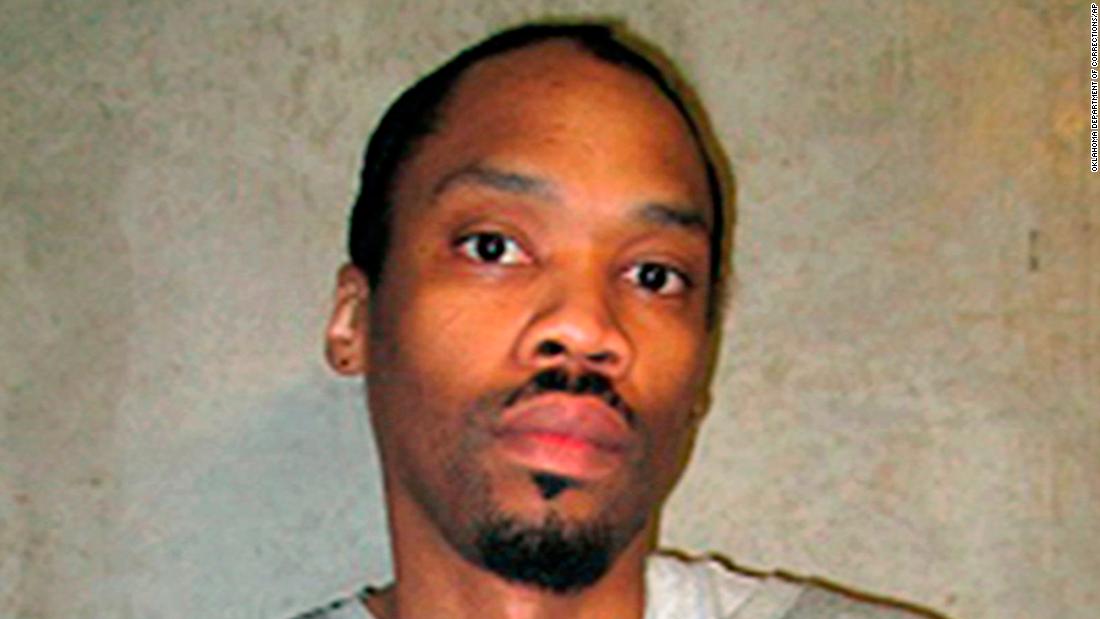CNN has reached out to Gov. Stitt’s office and has not heard back.
“Governor, you still have a chance, you still have time,” she said. “You have time Gov. Stitt to get this right.”
The 11th-hour decision comes after years of protest over Jones’ death sentence.
Jones has been on death row for nearly 20 years in connection with the 1999 murder of Paul Howell. Jones says he’s innocent, as do his family, attorneys and supporters. Howell’s family, however, remains convinced of Jones’ guilt.
Supporters protest at governor’s mansion
At a news conference Wednesday evening, Jones’ mother described her son’s scheduled execution as a lynching.
“If you think Julius is guilty, give him a fair trial. Do it over again, do it right!” Davis-Jones said as the crowd erupted in applause. “If my child is executed tomorrow or any day, it should be without a doubt. Not even a little bit of doubt.”
“It’s a shame it’s gotten this far,” Mayfield told reporters Wednesday as he teared up. Mayfield played football at the University of Oklahoma. “Hopefully God can intervene and handle it correctly and do the things He needs to do.”
Support for Jones has also gone international, with a representative from the European Union weighing in via a letter to Stitt.
Victim’s daughter says the family has been ‘re-victimized’
Howell was killed in a carjacking the night of July 28, 1999. Around 9:30 p.m., Howell, his adult sister and his daughters pulled into his parents’ driveway in his 1997 Suburban, according to court documents. Howell’s sister told his daughters to gather their belongings and was exiting the vehicle when she heard a gunshot, court documents say.
Howell’s sister glanced back, court documents say, and saw a Black man who she said was wearing jeans, a white T-shirt, a black cap and a red bandana over his face. The shooter fired again as Howell’s sister and his daughters ran to the house, documents say. Howell died about 1:45 the next morning.
Jones, 19 at the time, was arrested on July 31, the day after authorities found the murder weapon wrapped in a red bandana inside his family’s home.
He was tried alongside a co-defendant, Christopher Jordan, who was sentenced to 30 years in prison after pleading guilty to first-degree murder and conspiracy to commit a robbery, per online court records. Jordan testified against Jones, who was convicted and sentenced to death.
Howell’s daughter, Rachel Howell, and her family believe Jones is guilty of her father’s murder. She said in a statement to CNN that Jones, his family and the defense team “want people to believe that Julius Jones is completely innocent, despite the overwhelming amount of evidence against him.”
“Overall, this has been extremely tough on our family,” she said, “as we have continued to be re-victimized by Julius Jones when we have done absolutely nothing wrong.”
Davis-Jones, Julius Jones’ mother, has said the last two decades have been “a waking nightmare for my family,” but she said she will keep the Howell family in her prayers.
“I know what it is like to have a loved one ripped away from you and to constantly relive that loss. I hope and pray they find healing and peace,” Davis-Jones said.
There are conflicting stories about the evidence in Jones’ case
The case has been marked by stark conflicts over the evidence against Jones, as well as questions about the reliability of the testimony of his co-defendant.
First, there’s the alibi. Jones’ family said he was home the night of the murder, according to the clemency petition.
Then-Attorney General Mike Hunter’s office said the alibi was thoroughly investigated and found not to be credible, adding the claim was explored in an evidentiary hearing ordered by the Oklahoma Court of Criminal Appeals.
Jones himself was inconsistent about where he was the night of the murder, the AG’s office said, adding two of Jones’ trial attorneys testified he told them his family was mistaken and he was not home when Howell was killed.
Another point of contention has been over a red bandana, which was found inside Jones’ family home with the murder weapon wrapped in it.
The clemency petition cites several individuals who said his co-defendant, Christopher Jordan, admitted to killing Howell and hiding the weapon and bandana inside Jones’ house.
The petition also said Jordan spent the night at the home a day after the murder.
The AG’s office pointed to DNA testing done at the defense’s request on the red bandana. The results, the office said in a document released in July 2020, indicated the major component of the DNA profile matched Jones and excluded Jordan.
In response, Jones’ team said the DNA tests results were limited, and Jordan’s DNA could not be excluded.
The jury was also not shown a photo of Jones, taken days before Howell’s killing, that the petition says would have shown he did not match the shooter’s description. Several jurors have come forward and indicated this evidence might have changed the outcome of the case.
Then there’s the issue of alleged racial bias in the case. According to the petition, one juror said they heard another juror refer to Jones as the n-word. Additionally, when Jones was arrested, a police officer also called him the n-word, the petition alleges.
The AG’s office contests claims of racial bias, noting the juror who claimed to have heard another use the n-word did not specifically raise the issue during Jones’ trial. She had brought to the court’s attention another comment made by a juror, but per the AG’s office, an appellate found it unlikely the juror would fail to mention the racial epithet when she’d reported the other comment.
CNN’s Raja Razek, Theresa Waldrop, Dakin Andone, Amy Simonson and Claudia Dominguez contributed to this report.





More News
Gaza War Puts New Pressures on U.S. Arms Transfer Policies
After the Met Gala, the Parties Lasted All Night
Security Guard Injured in Shooting Outside Drake’s Home in Toronto